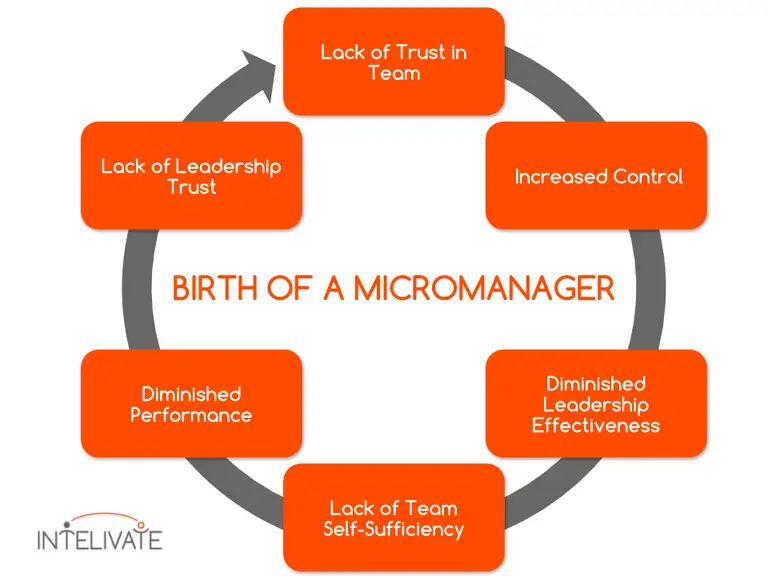Low productivity, heightened stress, and reduced creativity are just three of the many negative effects of micromanagement. And while many managers don't actively try to micromanage, sometimes they just can't help but take control over every little thing that their team members do.
However, micromanaging can create a toxic work environment in any organization, and it's important that managers at all levels understand just how bad it really is.
To help, here is a guide explaining what micromanaging is, what it looks like, and the negative effects of micromanagement on both employees and an organization.
Why do managers micromanage and what does it look like?
By definition, ‘micromanaging' is when a leader ‘tries to control every part of a situation, even small details'.
In the workplace, this means that a micromanager will do everything in their power to feel as if they have total control over their team and the projects they are responsible for. This often happens when a manager is either a perfectionist or, perhaps they feel as if their job is on the line, so they take excessive control of everything.

When managers micromanage, they may show the following signs of micromanagement:
- Frequently walk around the office to check what staff are doing at their computers.
- Periodically check their team's online ‘active' statuses on Microsoft Teams, Slack, Skype, or other online workplaces.
- In some cases, micromanagers may also take a controlling approach when completing tasks and projects. Oftentimes, micromanagers cannot let go of responsibilities, and they may even assign projects to others but will end up taking over anyway. They are unable to delegate tasks efficiently.
- The lines of communication are broken and micromanagers check up on others without communicating their intent.
Micromanagers will frequently:
- Be ‘nit-picky' about small details of little importance.
- Criticize a team member's approach to a project, even if the outcome was a success.
- Completely redo a team member's work, even when the original was correct, making the original work a waste of time.
- Take away responsibilities without justification.
While these micromanagement issues may not seem like a big deal as individual instances, they can still have a massive negative impact when built up over time. Here is a closer look at the kind of impact that management style has on employees and organizations.
The negative effects of micromanagement – on employees
For employees, this style of management can impact their quality of work, job satisfaction as well as their personal well-being. The psychological effects of this management style include:
Increased stress, frustration, and burnout
When employees constantly feel as if everything they do is scrutinized, they become frustrated and stressed at work – which often leads to burnout. Not only that, but they will feel a loss of autonomy, which can impact their work performance and capacity to be creative, solve problems, and excel in their role.
Decreased productivity
When employees are micromanaged, they often feel as if they cannot do anything right. They may also feel like nothing they do matters, which can affect job performance.
These negative feelings can drastically impact an employee's productivity in terms of their urgency to get work done, overall quality of work, and willingness to go above and beyond for the organization. They will also feel less motivated to get work done, and they may not even care about how well they complete a task as there is no culture of trust among employees.
Poor health and mental well-being
Increased stress can often have many other negative side effects on a person's physical and mental health. This can sometimes lead to:
- Increased alcohol, tobacco, and substance abuse
- Eating disorders and unhealthy weight loss/gain
- Increased blood pressure and cardiovascular disease
- Sleep interruptions
- Mental health issues such as depression and/or anxiety
- No engagement with the company
No matter how great a company is, if an employee has a bad experience within their team, they will associate that negative experience with the entire company. They may also take increased sickness absences compared to happier, healthier employees.
That means that they will be less likely to speak positively about the company, will not recommend its products or services to their friends, and will not recommend it as a good place to work. In short, they will tell everyone around them what toxic work environment it is.
Additionally, they will be less likely to engage in company initiatives, and they will not see themselves as being a part of the organization.
The negative effects of micromanagement – on employers
Is micromanaging bad for employers as well? Absolutely. Here's how:
Stifles creativity and innovation
Organizations thrive on creativity and innovation in order to solve problems and get ahead of competitors. However, this entrepreneurial culture cannot thrive when employees are micromanaged. In order to be innovative, employees need to feel as if they work in a safe place to take risks, make mistakes, and try new things – none of which can happen when they are being controlled by their boss.
Not scalable
To put it simply, one micromanager cannot realistically take on the work of all of the employees that they look after. When managers act as micromanagers instead of leaders, their team often becomes dependent on them. Or, managers may waste time completing tasks that are not their responsibility, which makes this management style toxic for everyone involved.
A culture of micromanagement is just not sustainable, scalable, or practical for companies in the long term. Managers cannot control everything; everyone needs to do their part to create a strong workplace environment.
Damages employee trust
Fostering trust and loyalty within a company's workforce is a valuable competitive advantage that takes a long time to build. When this sense of trust exists, employees are more likely to speak positively about their employers, they will feel secure in their position, and they will not share company secrets or seek employment elsewhere.
However, when employees are micromanaged, this sense of organizational trust is broken, and employees do not feel a sense of loyalty to the organization. This leadership style leads to a lack of trust in the entire team and an overall hostile work environment.
Increases turnover
Employees do not want to show up to work each day only to feel stressed out, unappreciated, and as if their place within the organization does not matter.
That's why severe micromanagement issues at any level of an organization can negatively impact the turnover rate. Employees will inevitably leave the company for a position elsewhere where they feel valued and free to be creative and have more honest communication.
This impact on employee turnover can bring with it a number of associated costs related to recruitment, lost productivity, and increased training. Not only that, but if a micromanager is left to continue without repercussions, the cycle will only continue with new hires.
Learn More
Seeking efficient scheduling and time tracking methods? Our Work Environment section offers powerful tools and tips.
How can you make the most of a hybrid work environment? Learn about hybrid culture in the modern world in our latest article.
Address mobbing at work directly to safeguard employee well-being and maintain a healthy work environment.
Implement allowing self-scheduling to empower your workforce and boost overall job satisfaction.
Recognize and address the warning signs outlined in our discussion on signs of poor management.
Explore effective initiatives that promote work-life balance initiatives that work to harmonize your team's personal and professional life.
67% of workplaces report issues with negativity at work. Our strategies can help create a more positive environment with negativity at work.
Wrapping up
Micromanagement as a style of leadership is harmful to everyone. The negative effects of micromanagement can cause your best people to leave because of a lack of trust, chronic stress, or just plain lack of job satisfaction. If your workplace shows signs of chronic micromanagement, it's time to nip it in the bud before it hurts your long-term success.
And one way to do that is to track your time in at work, whether hybrid, remote, or in the office. By tracking your time, you'll improve team dynamics, establish a culture of trust, and eliminate a huge chunk of micromanagement.
Get started today and grab your free trial of Unrubble!
Frequently asked questions
What is the single biggest effect of micromanagement?
The biggest effect is the lack of motivation that happens when employees are micromanaged. They no longer have a positive work environment and lose the will to hit their personal and team objectives. Over time, a breakdown in communication happens too and it leads to employees quitting.
Is micromanagement toxic?
Because of its effects on employees, yes. Having a micromanagement style spreads from one person (the team leader or manager) to the broader workforce. When one person micromanages, the sense of trust breaks and you no longer have a productive work environment. It is only a matter of time before micromanagement impacts your entire organization.
![The Negative Effects of Micromanagement & What It Says to Your Employees [GUIDE]](/static/image?src=https%3A%2F%2Fcdnblog.unrubble.com%2Fpayload-unrubble-images%2F33651026-1612-4a83-afa5-540627c98c97_large.jpg&width=1440&height=540&fit=cover&position=center&quality=65&compressionLevel=9&loop=0&delay=100&crop=null&contentType=image%2Fwebp)




